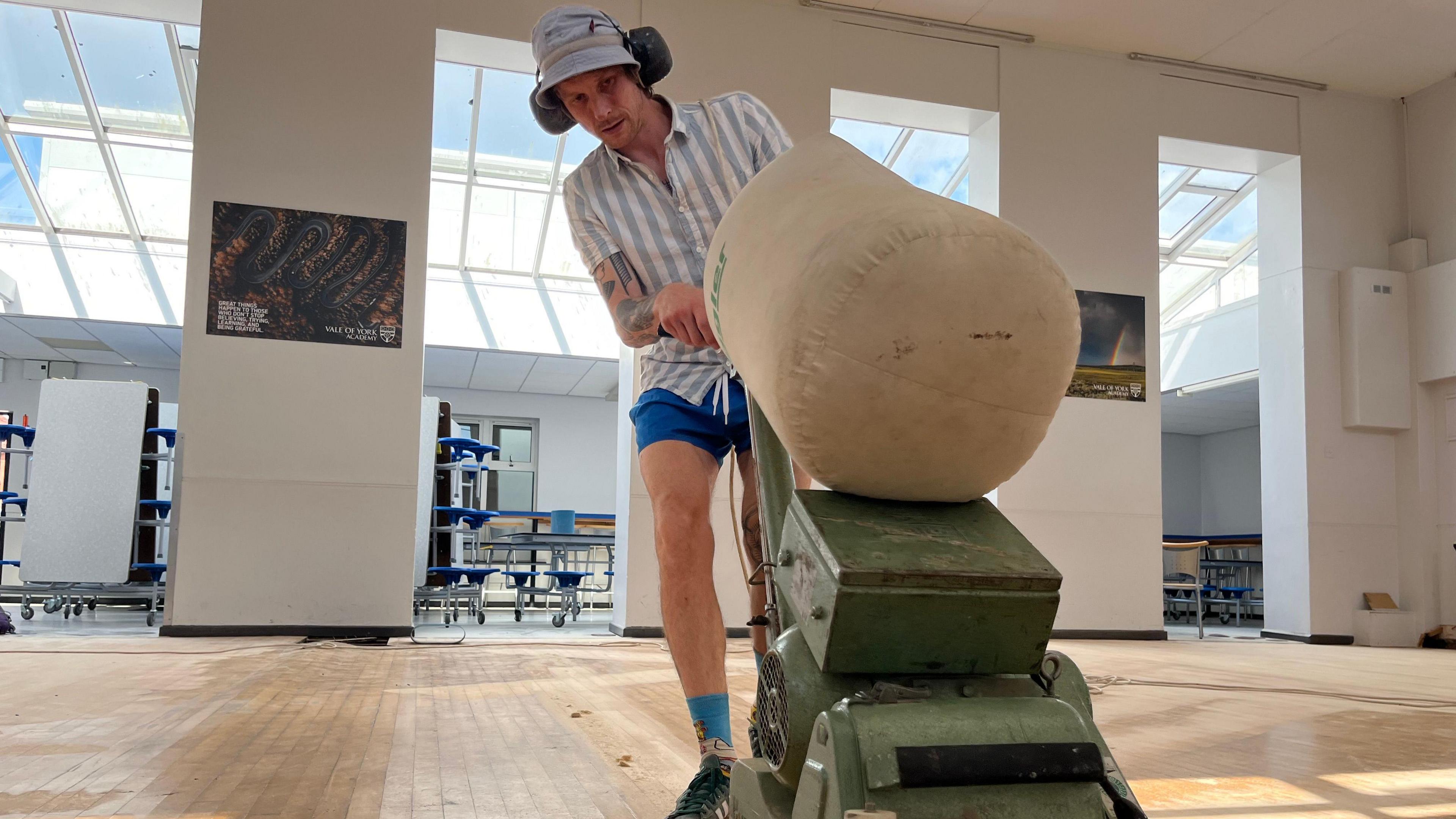I had surgery to lengthen my legs and then it went horribly wrong
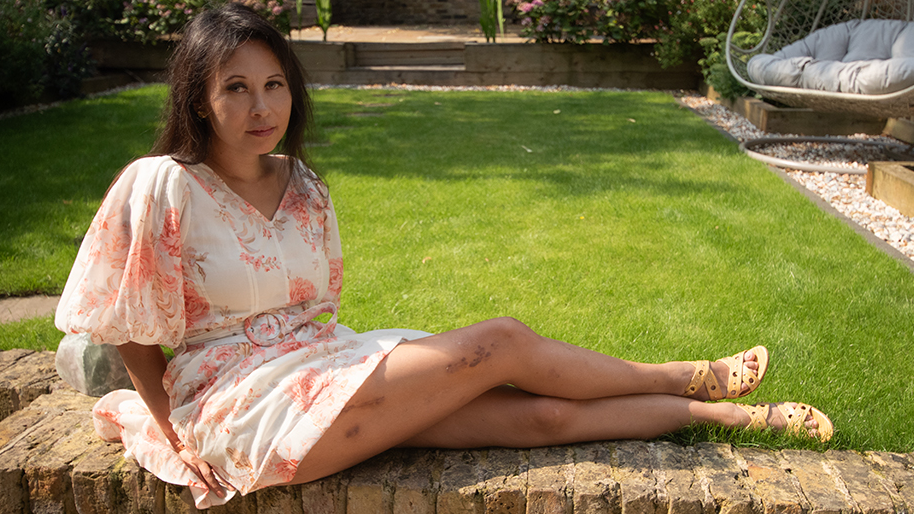
Elaine has suffered excruciating pain after her leg-lengthening surgery
- Published
Warning: This article contains medical details that readers may find distressing
Elaine Foo’s legs are streaked with thick, purple scars - each one a reminder of a leg-lengthening procedure which went badly wrong.
Since 2016, the 49-year-old has had five surgical procedures and three bone grafts, exhausted her life savings and brought a legal action against her surgeon, which was finally settled in July, with no admission of liability.
At one point, Elaine had a metal nail break through a bone and on another occasion, she says her legs felt like they were being “roasted from the inside”.
“My journey has been a trial of fire - but I survived,” she says.
Her doctor consistently denied any negligence and told the BBC he "wholeheartedly reject[s]" Elaine's account. He says that some of the issues arose from complications she had been warned of, and others arose through her own actions.
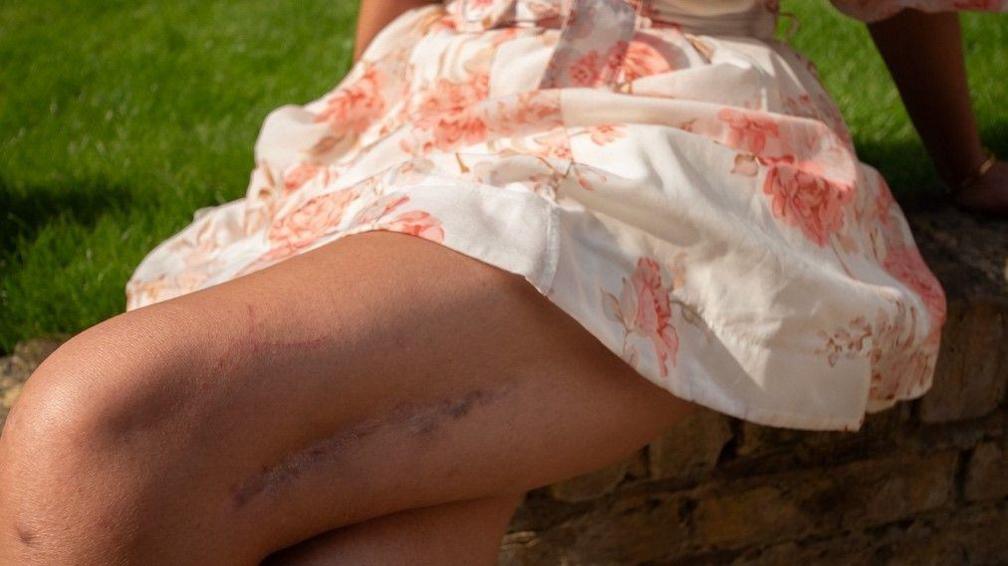
Elaine says having longer legs became an obsession, and believes she has body dysmorphia
Elaine always hated her height.
"At 12, I was taller than most girls," she says. "By 14, I was suddenly shorter than everyone. Over time it became an obsession. Taller means better. Taller means more beautiful. I just felt that taller people had more chances."
By adulthood the obsession was overwhelming.
Elaine believes she had body dysmorphia, a mental health condition where a person sees a flaw in their appearance no matter how others see them. The impact of the condition can be devastating.
At the age of 25, Elaine came across an article about a Chinese clinic where people were having surgery to make their leg bones longer. The piece contained grisly details of medieval-looking leg cages and rampant infection. It sounded nightmarish but left Elaine intrigued.
"I know people will question the vanity of it," she says. "But when you face body dysmorphia, there's no rational explanation for why you feel so overwhelmingly bad."
Sixteen years later, Elaine discovered a private clinic offering the procedure in London. It was being provided by the orthopaedic surgeon Jean-Marc Guichet, a limb-lengthening specialist who had even created his own lengthening device - the Guichet Nail.
“That was really a hallelujah moment, because I could do it in London and could recover at home,” she recalls.
“Dr Guichet was open about the kinds of things that could go wrong. Nerve injuries, blood clots, the possibility of bones not fusing back together.
“But I’d done my research, was going to a very expensive doctor and I expected commensurate medical care. My dream was to grow from 5ft 2in (1.57m) to 5ft 5in (1.65m).”
On 25 July, at a cost of around £50,000, she went in for surgery and set in motion a process which would change her life.
Leg-lengthening procedures are relatively uncommon, but available at private clinics around the world. Depending on where it’s carried out, it can cost anything from £15,000 to upwards of £150,000.

Elaine says she initially felt no pain after the operation
“Waking up was very exciting, because it felt like nothing happened. No pain. But 90 minutes later, it starts. It felt like someone was cooking my legs. Like being roasted from the inside. That first night I screamed until 6am, until I fell asleep screaming.”
With this procedure, some pain is to be expected. During the operation, the leg bones are broken in two and a metal rod is fitted inside.
The metal rods are gradually extended to increase their length and pull the two halves of bone apart. This process is meant to increase the patient’s height. The broken bones should gradually heal back together, to fill the gap in between.
The operation is complex, and it’s only the start of a long process.
“The lengthening process takes about two or three months and then you have at least double that time before you’ve recovered reasonable function,” warns Prof Hamish Simpson, former council member of the British Orthopaedic Association. “For most people, it's going to take a year out of your life.”
Once surgery was over, Elaine’s lengthening process began. Several times a day she carried out an uncomfortable regimen, rotating her legs to trigger the rod’s ratchet mechanism. This is what makes the nail lengthen and her legs grow. But two weeks later, she says disaster struck.
“I’d been feeling a lot of pain in my left leg. Then one night, while I was moving around in bed, I heard what sounded like a Kit Kat crunch, followed by severe pain.”
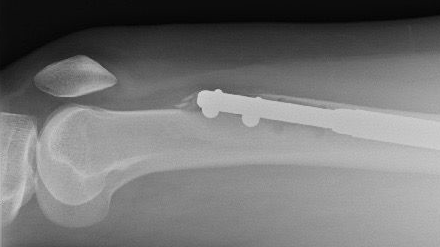
The nail in Elaine's left leg had broken through her femur
Elaine went in for a scan, which confirmed her fears. The nail in her left leg had broken through her femur - the thigh bone - the strongest bone in the human body. She was distraught, but she says she was reassured by Dr Guichet.
“He told me that all you need to do now is not worry. Wait for it to heal and once it's healed, we’ll begin the process again.”
They would continue lengthening Elaine’s right leg, while scheduling another operation to deal with her left leg - which would eventually be lengthened the same amount as the right.
Elaine says she was told the extra operation would cost thousands of pounds, but was happy to pay if it meant she could see the process through.
By September, her right leg had reached its 7cm target. But things weren’t quite right. The discrepancy between her right and left leg was causing problems, curving her spine and leaving her in constant pain.
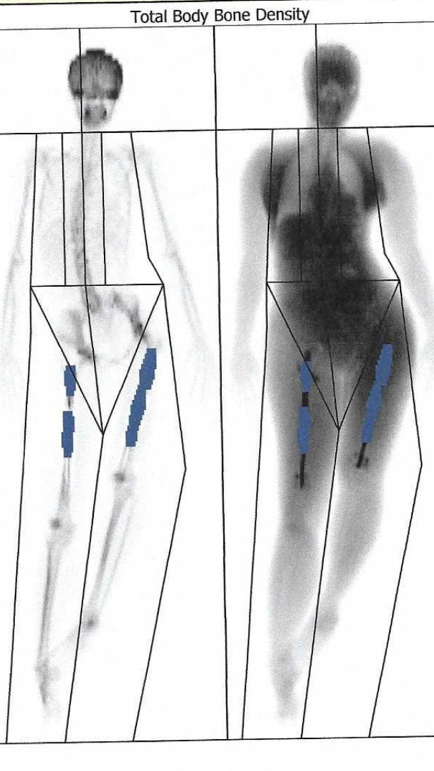
Six weeks later, scans of her right leg showed an alarming lack of bone growth. Her femur was essentially two bits of bone held together by the metal rod.
Elaine turned to Dr Guichet for help, who scheduled another operation at a clinic he worked at in Milan. In April 2017, they restarted the lengthening process in Elaine’s left leg, while also injecting bone marrow into the right leg - to stimulate bone growth there. After the operation, Elaine woke to more bad news.
“Dr Guichet told me the nail had broken while he was taking it out,” she says. “He had a nail from another patient which he was able to insert.” She adds that this was going to cost even more money.
Three days later, hardly able to move, but desperate to be home, Elaine returned to London. She says communication with Dr Guichet had soured and feels that by summer the doctor-patient relationship had broken down.
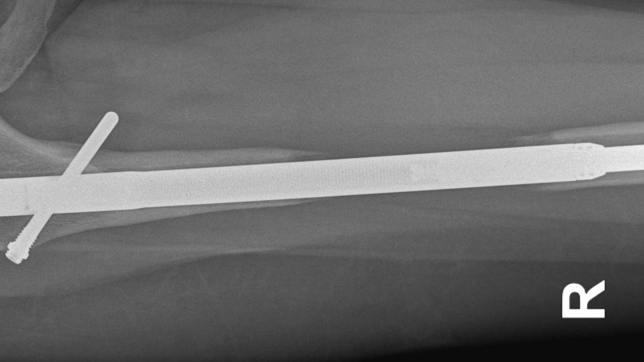
Elaine's right leg showed a lack of bone growth, requiring further treatment
She didn’t know where else to turn and by July 2017 she managed to see a specialist orthopaedic surgeon on the NHS.
She says the specialist told her "this will not be a short journey."
"I had to prepare myself for at least five years of treatment before healing fully," she says.
Eight years on from the initial surgery Elaine says she is still recovering from her mental and physical scars. She has a range of mobility issues and says she suffers from PTSD.
“From 2017 to 2020 I hid from the world. I was single, unemployed, penniless and disabled.”
But recently she’s begun to get closure. A four-year legal battle was finally settled in July when Dr Guichet agreed to pay Elaine a “substantial” sum to settle her claim against him - without any admission of liability.
Dr Guichet told the BBC: "Ms Foo’s account is a gross misrepresentation of the facts, which I wholeheartedly reject.
"Over the past 35 years I have successfully performed this surgery almost 800 times, immeasurably improving the lives of hundreds of patients. The wellbeing of my patients is always my priority, and I am in close contact with patients and their families to support them throughout their recovery.”
The surgeon’s lawyer denied any negligence on Dr Guichet’s part, telling the court: “Dr Guichet’s case is that there was no negligence, that the fracture and delayed bone healing were unfortunate non-negligent complications that Ms Foo was warned of before surgery, and that the limited right-sided bone regeneration was aggravated by Ms Foo’s undisclosed use of anti-depressants and by her deliberately extending the nail in her right leg beyond the agreed length.”
He also claimed in court that Ms Foo had “frequently declined” to follow Guichet’s advice and had neglected her rehabilitation and physiotherapy.
Elaine contests all of these claims. She says the anti-depressants were not linked to the complications and holds the doctor responsible for what happened to her.
Elaine assumed she was safe because she was paying so much. But she has paid more than just a financial price.
“I lost the best years of my life. I know people like to hear the word regret and if someone asked me today, would you have done it, if you knew you were going to go through all this? I would say a definite, ‘No, thank you very much’.”
Update 16 August: This article was amended after publication to include a new comment from Dr Guichet.
You might also be interested in...
- Published18 July 2024

- Published30 July 2023
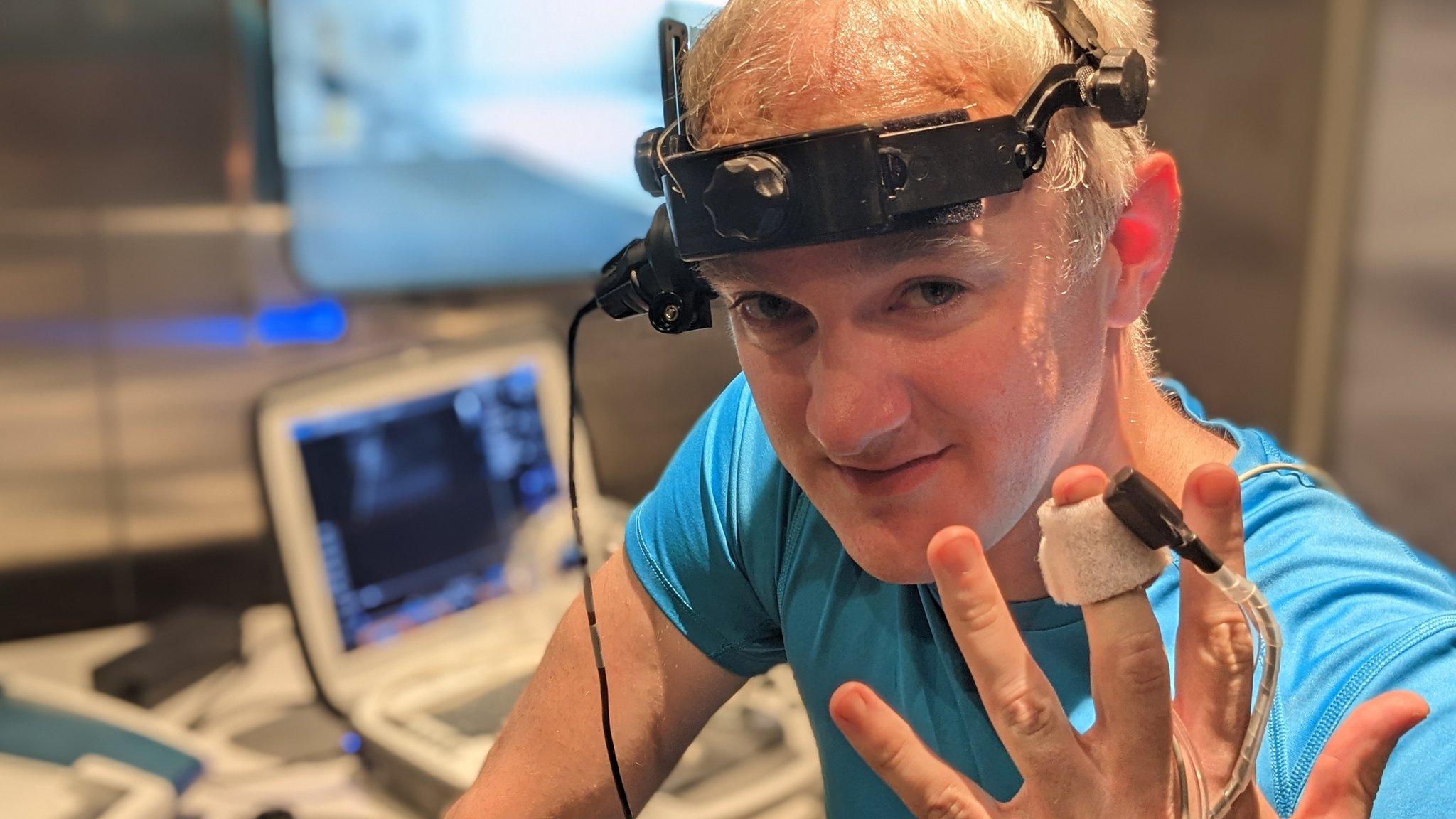
- Published20 June 2023
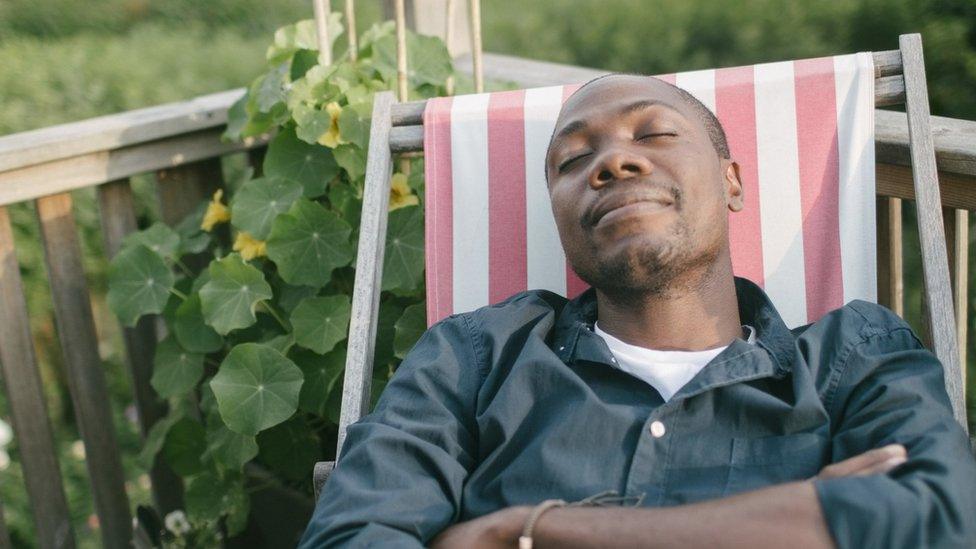
Weekend reads
- Published11 August 2024
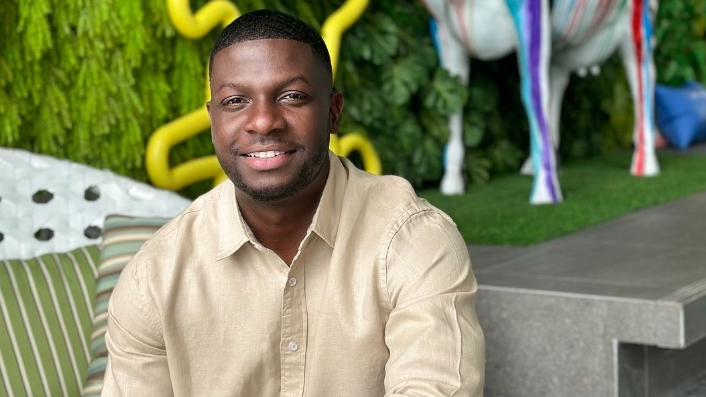
- Published11 August 2024
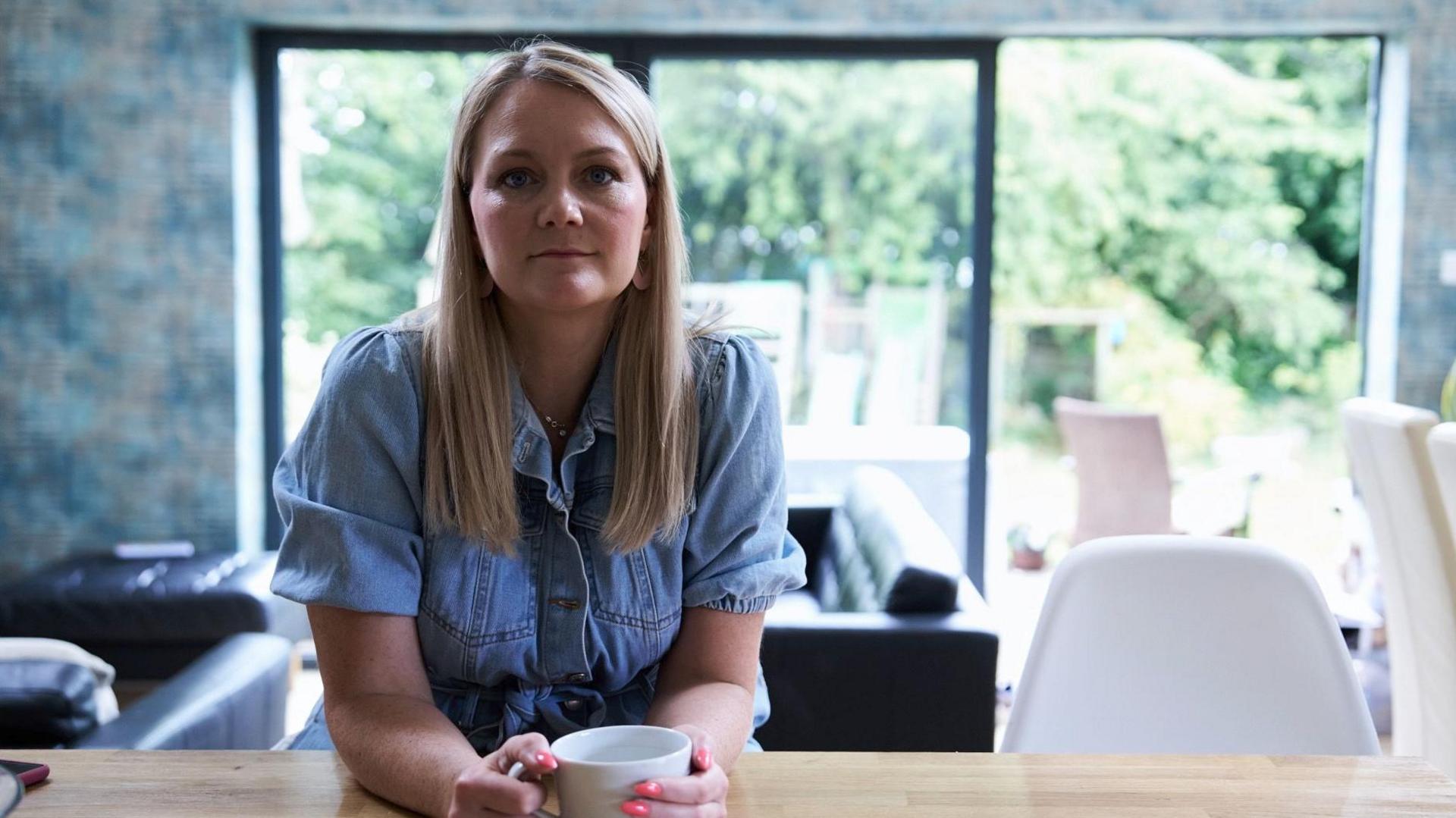
- Published11 August 2024

- Published11 August 2024
